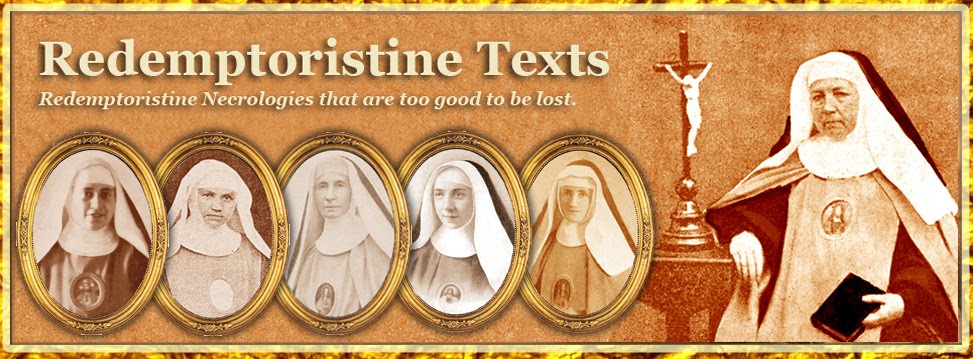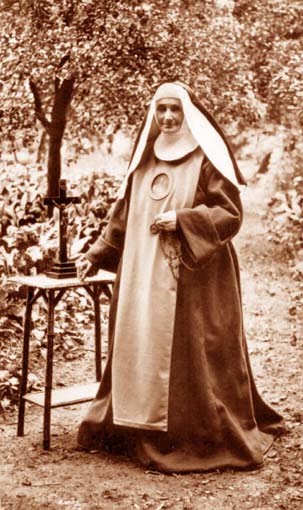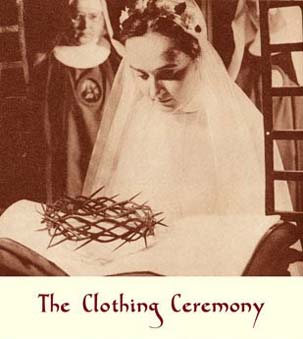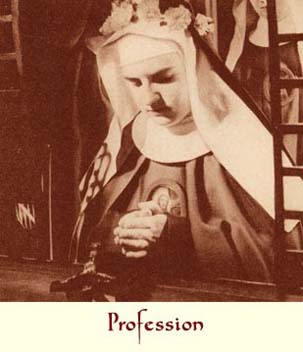Chapter IV. Virtues of the venerated Mother (continued).
I. Her love for her neighbour.
We have already spoken of the zeal that inspired Mother Marie-Joseph for the salvation of souls. We must now speak of her charity in regard to her daughters.
The goodness of her nature was united to grace to make it easy for her to exercise a very maternal charity. Always disposed to help and devote herself with warmth and good humour, she received the Sisters with a great kindness and family spirit. To everyone she showed a great confidence and a sincere affection. In regard to everyone she acted with uprightness, seeking only God and the good of souls.
To a high degree she possessed the spirit of counsel, and in difficulties, she was found to have a prompt and assured decisiveness, given without emphasis and with the affection of a mother. “God and our neighbour” was the usual sense of her recommendations, but, so that no one was deceived, she insisted most particularly on the love of neighbour, as per the example of Saint John the Evangelist, Saint Alphonsus and so many others. She herself saw all her daughters in the Sacred Heart of the Saviour, made everyone most welcome, and showed herself always ready to do them good. It was a grace that she earnestly requested from God, and she obtained it. Also, in the community, we could testify to the fact that she showed everyone a very special care. Whether they were professed, novices, educandes or postulants, no one was excluded from her heart. As soon as she appeared, joy shone on everyone’s faces, and if some cloud of sadness betrayed interior cares, the good Mother was soon able to make them dissipate. How many times did she in all simplicity make the first move to put a soul at ease and give it serenity! How many times did an admitted fault become the title to a more lively affection towards she who had committed it! How many times did we see the revered Mother show a very special charity towards she who had caused her some distress or brought her some difficulty!
In certain circumstances, however, she deployed a rare firmness. Certain faults found no grace with her. One day, she imposed a penance upon a Sister to which she reacted strongly. “I wished for your good,” she told her some time afterwards, “and you will thank me in Paradise.” – “Oh, I never thought about that!” replied the Sister immediately. “Yes, my Mother, you have done me a great good, and I am very grateful to you for it.”
“The care of the sick,” said Saint Alphonsus, “is one of the principal duties of the Superior.” Mother Marie-Joseph in no way forgot it. It was a terrible trial for her maternal heart when, in the space of a little more than two years (11th January 1890 – 22nd May 1892) five Sisters of a little advanced age were taken from her after long illnesses! How much care and time did she devote to these dear invalids, calculating neither fatigue nor inconvenience when she could console or comfort them! She watched with an extreme care to make sure that the Sisters Infirmarian surrounded them with all their care. As for herself, she attached herself particularly to preserving them from sadness, that bad counsellor, and suggested holy thoughts to them. Far from hiding the gravity of their state from them, she encouraged them to unite their sufferings to those of Our Lord, and showed them heaven as their reward. Assisting them right to the end and burying them with her own hands was for her a duty, as she said, and a duty that she did not cede to anyone. Once they had entered into their eternity, she did not forget them. How many were the prayers that she addressed and had addressed to God for them, and on the return of their anniversaries, she never failed to recall them to the memory of their community and have them pray for them. And so the Sisters lived united with each other, even after deaths, and their memory did not perish.
Everything has been said about goodness. When it is good, that is, based on the love of Our Lord, it infinitely passes the natural goodness that is too often allied with weakness. The revered Mother’s goodness of heart drew from the divine love all its sensitivity and constancy, and her daughters have preserved the most delightful memory of this too.
One of them writes: “When I came to present myself to the Convent of Saint-Amand, what struck me the most vividly in Mother Marie-Joseph was her maternal goodness. From the very first instant I felt at ease and easy to open up to her. A postulant whom I knew then came to see me in the parlour, and I admired the touching benevolence that the venerated Mother showed her, and on the other hand, the filial confidence that inspired the young Sister, who was rather feeble and sickly, in her dealings with her Superior. From this moment I was enlightened about the spirit that reigned in that blessed house. I told myself: “Here is a true house of the daughters of Saint Alphonsus. I shall be happy there.”
My presentiments did not deceive me. We know how slow to heal the wound caused by a tenderly cherished child is. Our good Mother excelled in that difficult art. I remember her with my grand-parents who had come full of tears to pour out their regrets and sorrow. The impression caused by the grilles added still further to their torments. They were broken-hearted and grieving, but our venerated Mother knew how to find such good words, and showed herself so sympathetic, so compassionate for them, and so maternal towards me that, from this first visit, they were won over and left less afflicted.
“How can I quote the thousands and thousands of stories about her sensitivity and her goodness? With an incomparable tact, with a rare understanding of the different characters, and the different ranges of spirit and virtue, she knew how to adapt herself, if that is the right term, to the measure of each one, to encourage them, console them in all their pains and give each one of them the best advice. If her intervention was not enough to dissipate certain kinds of anguish, she would call the venerated spiritual Father of the community to her aid, and would seek superior lights from him.”
The Sister to whom we owe these edifying details was one day named Mistress of Educandes. The revered Mother gave her these most wise counsels. “Be united to your Superior,” she told her, “You will not do good except for this condition. As for the Educandes, form them little by little to despoil themselves of the views and habits of the world, and from their too strong attachment to their families, but make them love the yoke of Our Lord. Accustom them to a prompt, simple and entire obedience, and support them in that dilatation of heart which helps them so marvellously to follow the good way. Form them to think habitually of Our Lord, to unite their actions to His, and to imitate His most holy virtues. Nourish in them a great love for the Blessed Virgin, and may they honour her especially on Saturdays. They will go far, if, right from the beginning, they conduct themselves thus according to the views of the faith. So accustom them all to receive everything from God, to offer everything to God, and especially the pains, sufferings and trials of life. Thus they will become the friends of the cross of the divine Redeemer, the only good of our souls and our only true joy here below.”
The revered Mother would forget, if necessary, her own sorrows to sympathise with those of others. The very same day she was struck down by apoplexy, she received, for the Sister whose witness we have quoted, some very painful news concerning the health of her mother. She did not wish to communicate it to her without preparing her first. “At about eight o’clock,” said the Sister, “she had me called, and reading with me, she sympathised greatly about the state of my poor mother, reduced to being not able to express herself except by signs. Her compassion was immense for this kind of trial, so she put all the resources of her great heart into action to console me. I will never be able to forget that last conversation, provoked entirely and uniquely by her maternal goodness, and when, on that very same day, I found that she herself was deprived of language and incapable of saying a single word, you can guess how poignant my feelings were. But the Lord had judged her strong enough to bear this last cross.”
II. Her generosity towards the poor. – Her meekness, her humility, and her spirit of mortification.
The charity of the Reverend Mother Marie-Joseph extended beyond the limits of her Monastery, and when the community was in the position of being able to give a little more, the poor soon felt the effects of this relative ease. Every week, the good Superior would have a certain quantity of bread distributed, and each day she would feed some poor family. The houses in the street at Saint-Amand which she had bought never paid rent. Her goodness led her especially to help the families of Sisters that a reversal of fortunes had tested. It was thus that she invited to the Monastery the two nieces of one of them, whose brother found himself without a position, as his wife was ill. She housed them in the exterior, and these two children were the object of her tender solicitude, until their parents were able to take them back.
She also contributed to good works and helped the priests to do good by providing them with help. She did this one day with a great deal of sensitivity. The brother of one of the nuns in the Monastery had just been named the priest of a parish situated some miles from Paris. When his sister received the news, the Reverend Mother immediately told her: “Child, we must do something for your brother. Embroider a pall, and make it a good one.” A short time later, another sister came to see the nun. Immediately the good Mother wished to know what was lacking in the church, and they told her that there was an old statue of Saint Joseph there, all chipped, that had been relegated to the baptismal font. “I want to give them a new one,” said the Superior, “but your brother must never know where it has come from, and (she added laughing) he must believe it is a miracle.” So she had them make a little bag of white satin on which they attached a piece of parchment with these words: “To do me more honour”, and then they enclosed two bills of a hundred francs. “Go now,” she said to the visitor, “but keep our secret.” As was said, so was done. The good priest could not overcome his surprise when he found what he needed to buy a beautiful statue of Saint Joseph. In his next homily, he did not fail to recommend the unknown benefactor to the prayers of his parishioners. It was only later, on a visit to the Reverend Mother, that he saw the mystery solved.
The question of common recreations in convents is important. The revered Mother wanted them inspired, happy and charitable. The enemy of melancholy, she could not endure it in her Sisters. The conversations there were thus edifying, without being forced, and everyone was able to say her piece. The Reverend Mother had a good memory. From it she drew a mass of instructive stories drawn from the Lives of Saints, and she would recount them with interest. Sometimes she had some little feast organised, and it was filled with much warmth and happiness. Sometimes also, she began a canticle, and they had to continue it, especially if they were sad. The least sadness found no grace with her. And thus it happened that the Sisters would come out of the conversation sometimes more united to God than when they entered it. “It is through humility and meekness,” says Saint Alphonsus, “that a Superior gains the hearts of her Sisters.” The good Mother Marie-Joseph understood this, so one of her great merits was to have a disposition that was always the same. In every circumstance she possessed herself perfectly, and no one ever noticed in her any flashes of impatience or temper. Even in the greatest difficulties she would preserve a calm that recalled the eulogy given of Father Cafaro: “Always the same, Semper idem,” or of that other, applied to another priest: “He is as unchanging as the sun.” But she did not attain this without great humility.
On this point, the good Mother has left us some thoughts in a retreat notebook, the only one which has been preserved, as if providentially, as all the others have fallen victim to the flames. “I must try my best,” she says there, “to seek and aspire only to be scorned and forgotten by everyone. I must regard myself as the sweepings of the convent, which everyone has the right to trample under their feet. As a true Spouse of Jesus Christ, I must desire only humiliations and suffering, and to arrive there, I must try to receive with love and joy the occasions of humiliation, criticism, etc., which the good God will send me. When dame nature cries out, I shall take refuge with Our Lord who has become, for love of me, the opprobrium of mankind, and disowning everything that has happened to me, I shall thank Him and beg Him to aid me with His holy grace. I shall apply myself especially to receive little reproaches with an even temper and in a spirit of humility. If I learn that my conduct is blamed, and I am criticised, I shall not make excuses for myself, and I shall watch especially to be very considerate and charitable towards my Sisters. I recognize that I must apply myself wholeheartedly and not let any occasion pass to humble myself. This virtue is the foundation of the spiritual life, and God has made me see the whole price of it too clearly for me not to feel obliged to apply all my strength to make some progress in it every day.”
While she exercised the office of Housekeeper at Malines, she wrote: “I must try my best to acquire a great love for the cross and suffering. To get there, I shall nourish in myself a true devotion to the Passion, and I shall try to receive the smallest obstacles with respect, as if coming from the hand of God. The state of my health does not permit me to make great mortifications, so I shall apply myself especially to interior mortification, bearing in silence my little failings in the eyes of God, and taking what is given to me, pleasant or not. I shall profit well from the occasions of sacrifice that my work involves, and I shall cheerfully bear its fatigues, being very happy that it gives me some small occasion to suffer.”
Later on, the Reverend Mother had the joy of seeing her health recover, and then she was able to accomplish the mortifications prescribed by the Rule. She even surpassed its measure, but she let herself be guided in everything by obedience.
“Always have,” she said one day to one of her daughters, “a great esteem for suffering. Always accept it generously and unite yourself to Our Lord, but at the same time, ask from Him the strength and courage to bear it well.” She also said: “Let us accept with a good heart, and with love and gratitude, all the crosses that Jesus sends us. If you want to be a true Redemptoristine, you have to suffer.”
The revered Mother, in her position as the Superior, knew a great deal of suffering. Her interior pains were sometimes very great, but she knew that the mystery of the Crown of Thorns belongs most particularly to those persons clothed with authority. And so she united herself interiorly with the Ecce Homo, invoked the aid of Our Lady of the Seven Sorrows, and sanctified her pains by plunging them, if we are permitted to say so, into these two sources of life.
We have already spoken of the zeal that inspired Mother Marie-Joseph for the salvation of souls. We must now speak of her charity in regard to her daughters.
The goodness of her nature was united to grace to make it easy for her to exercise a very maternal charity. Always disposed to help and devote herself with warmth and good humour, she received the Sisters with a great kindness and family spirit. To everyone she showed a great confidence and a sincere affection. In regard to everyone she acted with uprightness, seeking only God and the good of souls.
To a high degree she possessed the spirit of counsel, and in difficulties, she was found to have a prompt and assured decisiveness, given without emphasis and with the affection of a mother. “God and our neighbour” was the usual sense of her recommendations, but, so that no one was deceived, she insisted most particularly on the love of neighbour, as per the example of Saint John the Evangelist, Saint Alphonsus and so many others. She herself saw all her daughters in the Sacred Heart of the Saviour, made everyone most welcome, and showed herself always ready to do them good. It was a grace that she earnestly requested from God, and she obtained it. Also, in the community, we could testify to the fact that she showed everyone a very special care. Whether they were professed, novices, educandes or postulants, no one was excluded from her heart. As soon as she appeared, joy shone on everyone’s faces, and if some cloud of sadness betrayed interior cares, the good Mother was soon able to make them dissipate. How many times did she in all simplicity make the first move to put a soul at ease and give it serenity! How many times did an admitted fault become the title to a more lively affection towards she who had committed it! How many times did we see the revered Mother show a very special charity towards she who had caused her some distress or brought her some difficulty!
In certain circumstances, however, she deployed a rare firmness. Certain faults found no grace with her. One day, she imposed a penance upon a Sister to which she reacted strongly. “I wished for your good,” she told her some time afterwards, “and you will thank me in Paradise.” – “Oh, I never thought about that!” replied the Sister immediately. “Yes, my Mother, you have done me a great good, and I am very grateful to you for it.”
“The care of the sick,” said Saint Alphonsus, “is one of the principal duties of the Superior.” Mother Marie-Joseph in no way forgot it. It was a terrible trial for her maternal heart when, in the space of a little more than two years (11th January 1890 – 22nd May 1892) five Sisters of a little advanced age were taken from her after long illnesses! How much care and time did she devote to these dear invalids, calculating neither fatigue nor inconvenience when she could console or comfort them! She watched with an extreme care to make sure that the Sisters Infirmarian surrounded them with all their care. As for herself, she attached herself particularly to preserving them from sadness, that bad counsellor, and suggested holy thoughts to them. Far from hiding the gravity of their state from them, she encouraged them to unite their sufferings to those of Our Lord, and showed them heaven as their reward. Assisting them right to the end and burying them with her own hands was for her a duty, as she said, and a duty that she did not cede to anyone. Once they had entered into their eternity, she did not forget them. How many were the prayers that she addressed and had addressed to God for them, and on the return of their anniversaries, she never failed to recall them to the memory of their community and have them pray for them. And so the Sisters lived united with each other, even after deaths, and their memory did not perish.
Everything has been said about goodness. When it is good, that is, based on the love of Our Lord, it infinitely passes the natural goodness that is too often allied with weakness. The revered Mother’s goodness of heart drew from the divine love all its sensitivity and constancy, and her daughters have preserved the most delightful memory of this too.
One of them writes: “When I came to present myself to the Convent of Saint-Amand, what struck me the most vividly in Mother Marie-Joseph was her maternal goodness. From the very first instant I felt at ease and easy to open up to her. A postulant whom I knew then came to see me in the parlour, and I admired the touching benevolence that the venerated Mother showed her, and on the other hand, the filial confidence that inspired the young Sister, who was rather feeble and sickly, in her dealings with her Superior. From this moment I was enlightened about the spirit that reigned in that blessed house. I told myself: “Here is a true house of the daughters of Saint Alphonsus. I shall be happy there.”
My presentiments did not deceive me. We know how slow to heal the wound caused by a tenderly cherished child is. Our good Mother excelled in that difficult art. I remember her with my grand-parents who had come full of tears to pour out their regrets and sorrow. The impression caused by the grilles added still further to their torments. They were broken-hearted and grieving, but our venerated Mother knew how to find such good words, and showed herself so sympathetic, so compassionate for them, and so maternal towards me that, from this first visit, they were won over and left less afflicted.
“How can I quote the thousands and thousands of stories about her sensitivity and her goodness? With an incomparable tact, with a rare understanding of the different characters, and the different ranges of spirit and virtue, she knew how to adapt herself, if that is the right term, to the measure of each one, to encourage them, console them in all their pains and give each one of them the best advice. If her intervention was not enough to dissipate certain kinds of anguish, she would call the venerated spiritual Father of the community to her aid, and would seek superior lights from him.”
The Sister to whom we owe these edifying details was one day named Mistress of Educandes. The revered Mother gave her these most wise counsels. “Be united to your Superior,” she told her, “You will not do good except for this condition. As for the Educandes, form them little by little to despoil themselves of the views and habits of the world, and from their too strong attachment to their families, but make them love the yoke of Our Lord. Accustom them to a prompt, simple and entire obedience, and support them in that dilatation of heart which helps them so marvellously to follow the good way. Form them to think habitually of Our Lord, to unite their actions to His, and to imitate His most holy virtues. Nourish in them a great love for the Blessed Virgin, and may they honour her especially on Saturdays. They will go far, if, right from the beginning, they conduct themselves thus according to the views of the faith. So accustom them all to receive everything from God, to offer everything to God, and especially the pains, sufferings and trials of life. Thus they will become the friends of the cross of the divine Redeemer, the only good of our souls and our only true joy here below.”
The revered Mother would forget, if necessary, her own sorrows to sympathise with those of others. The very same day she was struck down by apoplexy, she received, for the Sister whose witness we have quoted, some very painful news concerning the health of her mother. She did not wish to communicate it to her without preparing her first. “At about eight o’clock,” said the Sister, “she had me called, and reading with me, she sympathised greatly about the state of my poor mother, reduced to being not able to express herself except by signs. Her compassion was immense for this kind of trial, so she put all the resources of her great heart into action to console me. I will never be able to forget that last conversation, provoked entirely and uniquely by her maternal goodness, and when, on that very same day, I found that she herself was deprived of language and incapable of saying a single word, you can guess how poignant my feelings were. But the Lord had judged her strong enough to bear this last cross.”
II. Her generosity towards the poor. – Her meekness, her humility, and her spirit of mortification.
The charity of the Reverend Mother Marie-Joseph extended beyond the limits of her Monastery, and when the community was in the position of being able to give a little more, the poor soon felt the effects of this relative ease. Every week, the good Superior would have a certain quantity of bread distributed, and each day she would feed some poor family. The houses in the street at Saint-Amand which she had bought never paid rent. Her goodness led her especially to help the families of Sisters that a reversal of fortunes had tested. It was thus that she invited to the Monastery the two nieces of one of them, whose brother found himself without a position, as his wife was ill. She housed them in the exterior, and these two children were the object of her tender solicitude, until their parents were able to take them back.
She also contributed to good works and helped the priests to do good by providing them with help. She did this one day with a great deal of sensitivity. The brother of one of the nuns in the Monastery had just been named the priest of a parish situated some miles from Paris. When his sister received the news, the Reverend Mother immediately told her: “Child, we must do something for your brother. Embroider a pall, and make it a good one.” A short time later, another sister came to see the nun. Immediately the good Mother wished to know what was lacking in the church, and they told her that there was an old statue of Saint Joseph there, all chipped, that had been relegated to the baptismal font. “I want to give them a new one,” said the Superior, “but your brother must never know where it has come from, and (she added laughing) he must believe it is a miracle.” So she had them make a little bag of white satin on which they attached a piece of parchment with these words: “To do me more honour”, and then they enclosed two bills of a hundred francs. “Go now,” she said to the visitor, “but keep our secret.” As was said, so was done. The good priest could not overcome his surprise when he found what he needed to buy a beautiful statue of Saint Joseph. In his next homily, he did not fail to recommend the unknown benefactor to the prayers of his parishioners. It was only later, on a visit to the Reverend Mother, that he saw the mystery solved.
The question of common recreations in convents is important. The revered Mother wanted them inspired, happy and charitable. The enemy of melancholy, she could not endure it in her Sisters. The conversations there were thus edifying, without being forced, and everyone was able to say her piece. The Reverend Mother had a good memory. From it she drew a mass of instructive stories drawn from the Lives of Saints, and she would recount them with interest. Sometimes she had some little feast organised, and it was filled with much warmth and happiness. Sometimes also, she began a canticle, and they had to continue it, especially if they were sad. The least sadness found no grace with her. And thus it happened that the Sisters would come out of the conversation sometimes more united to God than when they entered it. “It is through humility and meekness,” says Saint Alphonsus, “that a Superior gains the hearts of her Sisters.” The good Mother Marie-Joseph understood this, so one of her great merits was to have a disposition that was always the same. In every circumstance she possessed herself perfectly, and no one ever noticed in her any flashes of impatience or temper. Even in the greatest difficulties she would preserve a calm that recalled the eulogy given of Father Cafaro: “Always the same, Semper idem,” or of that other, applied to another priest: “He is as unchanging as the sun.” But she did not attain this without great humility.
On this point, the good Mother has left us some thoughts in a retreat notebook, the only one which has been preserved, as if providentially, as all the others have fallen victim to the flames. “I must try my best,” she says there, “to seek and aspire only to be scorned and forgotten by everyone. I must regard myself as the sweepings of the convent, which everyone has the right to trample under their feet. As a true Spouse of Jesus Christ, I must desire only humiliations and suffering, and to arrive there, I must try to receive with love and joy the occasions of humiliation, criticism, etc., which the good God will send me. When dame nature cries out, I shall take refuge with Our Lord who has become, for love of me, the opprobrium of mankind, and disowning everything that has happened to me, I shall thank Him and beg Him to aid me with His holy grace. I shall apply myself especially to receive little reproaches with an even temper and in a spirit of humility. If I learn that my conduct is blamed, and I am criticised, I shall not make excuses for myself, and I shall watch especially to be very considerate and charitable towards my Sisters. I recognize that I must apply myself wholeheartedly and not let any occasion pass to humble myself. This virtue is the foundation of the spiritual life, and God has made me see the whole price of it too clearly for me not to feel obliged to apply all my strength to make some progress in it every day.”
While she exercised the office of Housekeeper at Malines, she wrote: “I must try my best to acquire a great love for the cross and suffering. To get there, I shall nourish in myself a true devotion to the Passion, and I shall try to receive the smallest obstacles with respect, as if coming from the hand of God. The state of my health does not permit me to make great mortifications, so I shall apply myself especially to interior mortification, bearing in silence my little failings in the eyes of God, and taking what is given to me, pleasant or not. I shall profit well from the occasions of sacrifice that my work involves, and I shall cheerfully bear its fatigues, being very happy that it gives me some small occasion to suffer.”
Later on, the Reverend Mother had the joy of seeing her health recover, and then she was able to accomplish the mortifications prescribed by the Rule. She even surpassed its measure, but she let herself be guided in everything by obedience.
“Always have,” she said one day to one of her daughters, “a great esteem for suffering. Always accept it generously and unite yourself to Our Lord, but at the same time, ask from Him the strength and courage to bear it well.” She also said: “Let us accept with a good heart, and with love and gratitude, all the crosses that Jesus sends us. If you want to be a true Redemptoristine, you have to suffer.”
The revered Mother, in her position as the Superior, knew a great deal of suffering. Her interior pains were sometimes very great, but she knew that the mystery of the Crown of Thorns belongs most particularly to those persons clothed with authority. And so she united herself interiorly with the Ecce Homo, invoked the aid of Our Lady of the Seven Sorrows, and sanctified her pains by plunging them, if we are permitted to say so, into these two sources of life.
This necrology is translated from Fleurs de l'Institut des Rédemptoristines by Mr John R. Bradbury. The copyright of this translation is the property of the Redemptoristine Nuns of Maitland, Australia. The integral version of the translated book will be posted here as the necrologies appear.




























